A Long Journey Having The Whole Bible
Written by a friend of the Kenyah
Imagine that the Bible in your own language has the New Testament, but only in the dialect of another village. Imagine sitting in church and the pastor is preaching from the Psalms. He opens the Bible and reads from it and it is in Bahasa Indonesian. Then he translates it into your language. He stumbles over some of the verses and hesitates over a few of the words. But he gets the message across. The Kenyah Badeng people in Sarawak do not have to imagine such a scenario. It is their reality. You may say, “No problem, the people understand Bahasa Malaysia (the official language of Malaysia), or Bahasa Indonesia–and some are fluent in English. They can read the Bible in those languages.”
But let me take you to a Kenyah village, we attend church, then sit and have fellowship after service, join the women in the kitchen as they cook or chat with the men about farming, hear moms telling their kids to go fetch this or that – and you will find that everyone is speaking in Kenyah.
The Kenyah New Testament is out of print and it is very hard to find a copy to buy. The Kenyah New Testament translation was facilitated by Pendita Tagang in the 1970s. Pendita Tagang was the local name of Ray Cunningham, an Australian Bible translator.
In the 1990’s several Kenyah pastors decided to translate the Old Testament. A committee was set up and the books of the Old Testament were assigned to the pastors. They received paper, pencils and candles since most of them were pastoring in churches in the interiors of Sarawak where there was no electricity. The pastors went back to their own villages and the committee did not receive any papers from the pastors. Some may have done the translation but did not have the opportunity to go back to the town. Some may have lost the translations due to the weather, or jungle conditions. Some who were tasked with the more challenging books did not know where to start or how to translate.
One of the pastors assigned with a book to translate was Pastor Uchat. He realised that he did not know how to do the translation. Several years later, he was asked to be the translator for the Old Testament. Pastor Uchat then spent more than a decade as the sole translator. Later on Pastor Egau joined him on the team. The project stopped in 2019. Then, Pastor Uchat became a Wycliffe Malaysia staff member. The organisation Gereja BEM Taman Tunku Bahasa Kenyah in Miri began a partnership with Wycliffe Malaysia to restart the project to complete the remaining 21 books of the Old Testament.
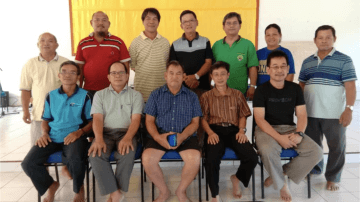
Gereja BEM Taman Tunku Bahasa Kenyah actually was started by those working on the translation. It started as a few Kenyah speakers worshipping together in the translation office on Sunday mornings. Then it grew to be a church with its own building. The church pays for the rent, utilities and internet for the translation office and now manages the project.
The team officially started translation again on 1 July 2021. At that time, Pastor Uchat was working from home and Timothy (Wycliffe Malaysia) could not travel to Sarawak to work with him. They spent two to three hours on the phone everyday as they worked on the book of Isaiah. They discussed key terms, key concepts, exegesis of the verses and formatting. They worked verse by verse until all 66 chapters (1292 verses) were checked. Prayers were answered when half way through the Isaiah translation, Cikgu Neilson joined the team. Then in September an Indonesian consultant checked the translation of the book of Isaiah using Zoom.
After that first check, the team worked with another consultant, Nell, who checked 2 Chronicles using Zoom. Starting in 2022 and onward, the team plans to have at least four consultant checks each year.
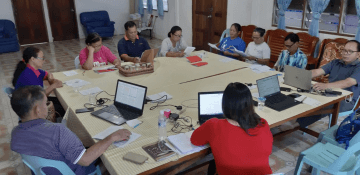
Before the pandemic the team travelled to villages in the interior for consultant checks. These checking sessions were opportunities for the team to share with the churches about the progress of the translation, and also to have people give input and feedback about the translation. Kenyah villages are spread out in the Ulu Baram area connected mostly by rivers and logging roads and communication is difficult. It is not easy to share the translated Scriptures in all of the villages.
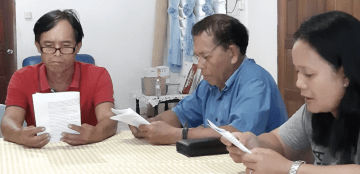
When the team went into the villages, the people took turns to help check the translation as they read portions of the Old Testament in Kenyah. The team often heard comments such as:
“Oh, I never realised that is the meaning of the story.”
“I have never read so much of the Bible in my life.”
“This is like a Bible study. I am learning so much about God.”
“When will you come again? Please put us in your calendar.”
The team members were often asked to preach at church services. One time, one of the team members preached from I Kings, the book they were checking at the time. One of the men helping the team to check the translation came up to him and said, “I didn’t realise that God expects leaders to be honest. Now that I’ve read 1 Kings, I understand what a leader should do, how a leader should behave.”
During the most recent check, one of the pastors said, “I’ve read that passage (Isaiah 10:15) many times in the Malaysian Bible and also the Indonesian Bible, but now that I read it in Kenyah, I really understand it. It is so clear.”
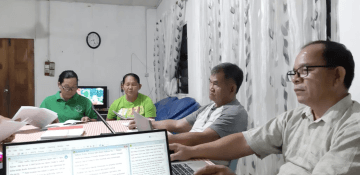
It is interesting to learn about the checkers who came to help. Often they came only because it was their turn on the duty roster prepared by the pastor. However, after a session or two, they would come back again even when they were not on the roster. When asked why, one lady answered, “I’ve never really understood the Bible before. I didn’t see the connection between the people in the Old Testament and my life. But when I read it in Kenyah, it is easy to understand and I realise that those people are like me too. I understand more about God and how and why he does things.”
Another man in a neighbouring village said, “Reading the Old Testament can be boring and difficult, but when we read together like this in Kenyah, it is interesting and we can learn so much.”
As the checking sessions came to an end, the most often asked question was, “When will you finish translating? When can we get the whole Bible?”
As of the end of 2021, the team will have 19 more books to complete. All are drafted but they need to be checked for:
- Accuracy: Is the translation exegetically accurate? Is it saying what it is supposed to be saying?
- Clarity: Do people understand it well? Could it be misunderstood in any way? Is there any unwanted or implied information?
- Naturalness: Does it sound like the way people talk?
- Acceptability: Will the Kenyah people accept how it has been translated?
There are several levels of checks during the translation process and every checking session needs people. A larger team of translators is needed to make sure that all types of checking are done properly.
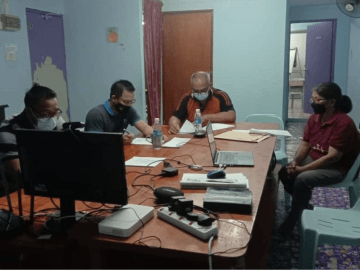
Finding consultants who speak Bahasa Malaysia or Bahasa Indonesia, and who have worked on Old Testament books, has been a challenge. To add to the challenge, the books that need to be checked are mostly the poetry or prophetic books. Praise God for providing consultants like Pendeta Joseph, Ibu Yunita, Pak Bob, Ibu Daphne, and Nell this year and for next year. The Consultant check is the last of a series of checks done on the translation of each book before it can be approved to be published. The consultant gives the approval.
Team members are working hard to reach the goal of translating all the books by the target date of 20 June2026. Ask God to bring in the people needed to complete this project. Pray for the church as people involved raise funds for the onsite work and for Wycliffe Malaysia as it raises funds for equipment, travels and more. Pray that the team will work well and produce a quality translation. Pray that the Kenyah people will have the entire Bible available to them soon and that they will grow in His Word and in their walk with Him.
*Adapted from this blog post with permission
The latest
View all articles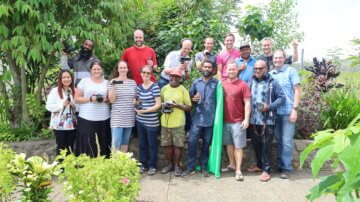
03/2024 Pacific: Papua New Guinea
Informing, teaching, inspiring: PNG workshop teaches video storytelling for language communities
PNG workshop teaches video storytelling for language communities
Read more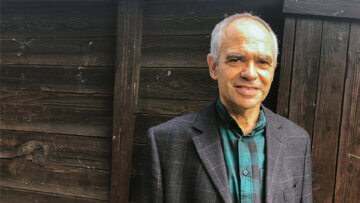
02/2024 Global
Looking ahead at 2024
As the year unfolds, we marvel at the work of God in our rapidly changing world. And, we look forward to a number of gatherings and conversations intended to draw us together.
Read more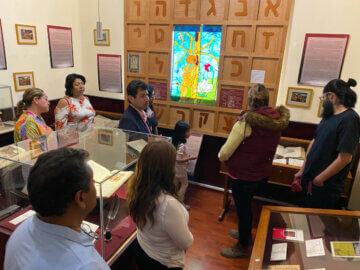
01/2024 Americas
Telling the Bible's Story
It may come as a surprise that a museum is among the Wycliffe Global Alliance organisations.
Read more